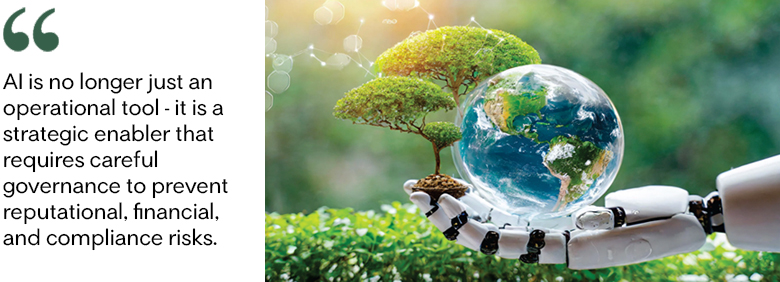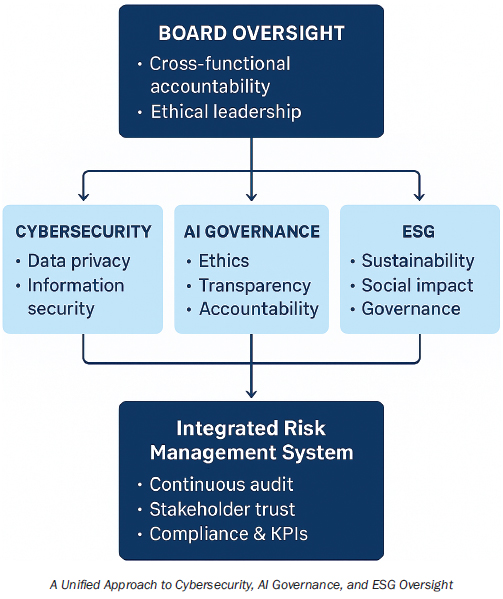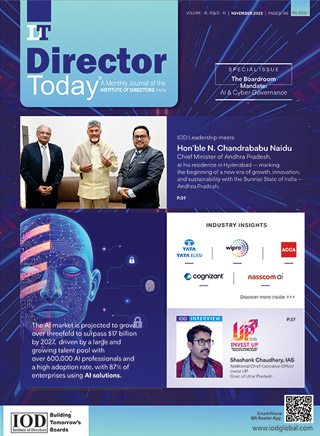Cybersecurity, AI, and ESG - A Unified Governance Approach for Sustainable Growth

The role of corporate directors has evolved dramatically in recent years. Today's boardrooms are no longer confined to financial oversight and regulatory compliance alone; they are at the forefront of shaping ethical, technological, and sustainability frameworks that impact not just shareholders, but society at large.
Cybersecurity has become a cornerstone of organizational resilience. A single breach can not only compromise sensitive data but also erode trust, invite regulatory penalties, and disrupt business continuity.
Artificial Intelligence has transformed the way businesses operate, offering unprecedented efficiencies, predictive analytics, and automation capabilities. However, it also introduces novel governance challenges. AI systems can perpetuate biases, infringe on privacy, and generate unforeseen risks if not designed, deployed, and monitored responsibly.
Directors should advocate for frameworks that:
• Establish explainability and fairness metrics
• Create data governance protocols
• Encourage responsible AI usage aligned with societal interests
AI is no longer just an operational tool—it is a strategic enabler that requires careful governance to prevent reputational, financial, and compliance risks.
ESG considerations, once viewed as peripheral, are now central to how companies are evaluated by investors, regulators, and customers. Environmental concerns demand sustainable supply chains and carbon reduction strategies; social responsibility mandates diversity, equity, and human rights initiatives; governance requires transparent reporting and ethical leadership.

Integrating Cybersecurity, AI, and ESG: A Governance Framework
A unified governance approach enables boards to proactively manage emerging risks while driving longterm value. Below is a framework that directors can adopt:
1. Board Oversight and Structure
• Establish committees dedicated to technology ethics, cybersecurity, and sustainability
• Define cross-functional accountability structures
• Ensure regular reporting to the board on AI risks, data protection, and ESG performance
2. Risk Assessment and Policy Development
• Conduct scenario-based risk modeling involving AIenabled tools
• Integrate cybersecurity audits into ESG reporting frameworks
• Align AI ethics guidelines with global standards such as OECD AI Principles and ISO 27001 cybersecurity controls
3. Stakeholder Engagement
• Engage employees, customers, regulators, and investors in technology governance conversations
• Promote transparency through regular disclosures and audits
• Develop crisis management protocols for data breaches or AI failures
4. Technology Enablement
• Invest in AI-driven cybersecurity tools for threat detection and risk analytics
• Implement privacy-by-design principles in new systems
• Use data governance platforms to ensure compliance with ESG reporting standards
5. Continuous Learning and Innovation
• Encourage scenario planning and red teaming exercises
• Train board members and executives on AI ethics and cybersecurity fundamentals
• Partner with industry groups, academia, and regulators to stay ahead of evolving threats


Challenges Directors Must Address
Despite growing awareness, many boards still face significant hurdles in implementing integrated governance:
• Lack of Expertise: Directors may not fully understand AI's technical complexities or cybersecurity frameworks.
• Regulatory Uncertainty: Jurisdictions vary widely in data protection and AI governance requirements.
• Cultural Resistance: Aligning technology teams with ESG goals requires organizational change management.
• Resource Constraints: Comprehensive governance models require investments in tools, training, and talent acquisition.
Directors must lead by example, prioritizing crossdisciplinary collaboration and embracing continuous learning to address these challenges.
The Strategic Advantage of Integrated Governance
Organizations that successfully integrate cybersecurity, AI, and ESG governance unlock several benefits:
• Enhanced stakeholder trust and investor confidence
• Reduced risk exposure and faster incident response
• Improved regulatory compliance and reputational resilience
• Innovation-driven growth aligned with ethical and environmental standards
• Competitive advantage in talent acquisition and partnerships
Boards that view governance as a strategic enabler—not merely a compliance requirement—will be best positioned to navigate disruption and deliver sustainable outcomes.
Author

Ms. Preity Gupta
She is the Global Board Advisor of WIPRO. With over 20 years of experience in enterprise security, AI ethics frameworks, and sustainable governance strategies, supporting global organizations across technology, finance, and healthcare sectors.
Owned by: Institute of Directors, India
Disclaimer: The opinions expressed in the articles/ stories are the personal opinions of the author. IOD/ Editor is not responsible for the accuracy, completeness, suitability, or validity of any information in those articles. The information, facts or opinions expressed in the articles/ speeches do not reflect the views of IOD/ Editor and IOD/ Editor does not assume any responsibility or liability for the same.

 Quick Links
Quick Links
 Connect us
Connect us




 Back to Home
Back to Home































